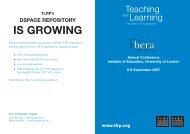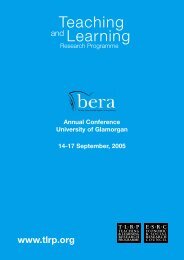Education 2.0? - Teaching and Learning Research Programme
Education 2.0? - Teaching and Learning Research Programme
Education 2.0? - Teaching and Learning Research Programme
- No tags were found...
You also want an ePaper? Increase the reach of your titles
YUMPU automatically turns print PDFs into web optimized ePapers that Google loves.
<strong>Education</strong>al hopes <strong>and</strong> fears for web <strong>2.0</strong>Neil Selwyn<strong>Education</strong>al responses to web <strong>2.0</strong>The evolving nature of web <strong>2.0</strong> makes it a ready vehicle for a number of educational agendas. We shouldremain cautious of some of the more exaggerated claims currently surrounding web <strong>2.0</strong>. Both ‘booster’<strong>and</strong> ‘doomster’ discourses have grown up around web <strong>2.0</strong>, portraying its possible educational ‘effects’ <strong>and</strong>‘impacts’ in decidedly overstated terms. 1 At one extreme are enthusiastic hopes for a complete transformationof education systems, with some commentators extending the technology terminology of ‘<strong>2.0</strong>’ through talk of a‘re-booting’ of teaching <strong>and</strong> learning. At the other, some commentators have used web <strong>2.0</strong> to generate moralpanics about young people <strong>and</strong> the supposed death of education.Web <strong>2.0</strong> <strong>and</strong> new forms of learningThere are strong links between web <strong>2.0</strong> <strong>and</strong> socio-cultural theories of learning, which see active <strong>and</strong> authenticlearning taking place best where knowledge can be constructed actively by learners who are supported incommunal social settings. It follows that web <strong>2.0</strong> tools may offer learners a more participatory experience oflearning in which individuals have increased opportunities to interact with more learners <strong>and</strong> with more learningresources.Much of the learning potential of web <strong>2.0</strong> is seen to derive from the co-construction of knowledge. Aconstructivist ethos lies at the centre of practices such as folksonomies, mash-ups <strong>and</strong> wikis, as well as being acentral tenet of popular web <strong>2.0</strong> philosophies such as ‘Smart Mobs’, ‘We Think’ <strong>and</strong> the ‘Wisdom of Crowds’. 2Notions of constructivism <strong>and</strong> constructionism inform recent celebration of the participative learning cultures ofvirtual societies <strong>and</strong> multi-player online games. 3 Similarly, the ability to collaboratively edit as well as individuallyread resources such as Wikipedia is seen to lead individuals to learn “what works <strong>and</strong> what does not in away that was not possible with books. You wouldn’t have even joined the debate”. 4 The collaborative spiritof these web <strong>2.0</strong> activities <strong>and</strong> many others like them has coalesced into a prevailing sense that “the internethas created greater opportunities for access, debate <strong>and</strong> transparency in the pursuit of knowledge than everbefore”. 4Web <strong>2.0</strong> <strong>and</strong> new forms of learnersWeb <strong>2.0</strong> technologies are also associated with significant shifts in the nature of contemporary learners. Apopular characterisation of upcoming generations of learners is that they are ‘digital natives,’ who have grownup in a world of computers, mobile telephony <strong>and</strong> the internet, <strong>and</strong> now lead lives that are reliant upon digitalmedia. These digital natives are seen to st<strong>and</strong> in stark contrast to older generations of ‘digital immigrants’ whoadopted digital media later on in their lives, having grown up without them. Commentators talk of young peopleas ‘homo-zappiens’, ‘net savvy’ <strong>and</strong> ‘power users’. Some commentators talk of the ‘internet generation’,‘generation M’ (media), ‘generation V’ (virtual) or ‘generation C,’ referring to characteristics such as connected,creative <strong>and</strong> click. 5 Their digitally-mediated everyday lives are characterised by constant change, withtechnology lying at the heart of mobile, reflexive, ‘liquid’ lifestyles. 6 These digital natives are thought to expecttechnology-assisted fluidity in all aspects of their lives, including the ways in which they learn <strong>and</strong> are educated.They are thought to have distinct expectations of education that involve learning which is personalised,accessible on-dem<strong>and</strong>, <strong>and</strong> available at any time, any place, or any pace. As Marc Prensky warned at the turnof the century, “our students have changed radically. Today’s students are no longer the people our educationalsystem was designed to teach”. 7
















